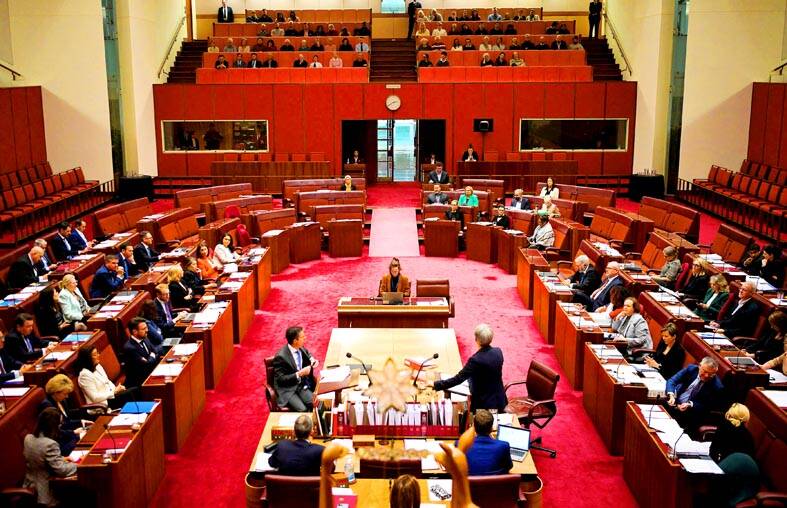The Australian Senate on Wednesday unanimously passed an “urgency motion” in support of Taiwan’s sovereignty and participation in international organizations.
Senators agreed by vote to move the motion “that United Nations Resolution 2758 of 25th October 1971 does not establish the People’s Republic of China’s [PRC] sovereignty over Taiwan and does not determine the future status of Taiwan in the United Nations, nor Taiwanese participation in UN agencies or international organizations.”
The motion was cosponsored by Australian senators David Fawcett and Deborah O’Neill, both of whom visited Taiwan last month to attend the Inter-Parliamentary Alliance on China’s (IPAC) annual conference.

Photo: Reuters
Addressing Parliament House in Canberra, Fawcett said that the motion was “urgent” because of the “growing risk to the security and stability in the Indo-Pacific” region.
“It’s important not just for the human rights of the 23.5 million people in the democracy that is Taiwan, but for the impact that a decrease in security and a conflict there would have on the rules-based order that underpins peace and security around the world, as well as for the global economic impact, which Australia would not escape,” Fawcett said.
O’Neill followed Fawcett’s remarks by saying that “the resolution does not mention Taiwan or address its political status.”
“Despite this fact, there is an ongoing and egregious campaign currently underway from the PRC to reinterpret the resolution and misrepresent what the resolution actually does,” she said, referring to China’s attempts to minimize Taiwan’s participation in the international community.
O’Neill said it was “not in the interest of the international community to have 24 million Taiwanese excluded” from critical bodies such as the International Civil Aviation Organization and the WHO.
Australian Senator Jacqui Lambie said that “the people of Taiwan continuously reject reunification [sic] with the Chinese Communist Party, with less than 5 percent of support for the reunification in Taiwan.”
“The Chinese Communist Party has no business in destroying democracy in Taiwan,” Lambie said. “Australia must stand up against the Chinese Communist Party and back the more than 22 million people of Taiwan who choose democracy and freedom over the authoritarianism of the Chinese Communist Party.”
Australian Senator Raff Ciccone said that Australia’s economic, trade and cultural interests with Taiwan “cannot be understated.”
Pledging to continue energy cooperation and support Taiwan’s transition to renewable energies, Ciccone told the house that Australia was Taiwan’s largest energy supplier, contributing “around two-thirds of Taiwan’s coal and almost half of its natural gas.”
In Taipei, the Ministry of Foreign Affairs (MOFA) yesterday welcomed the motion, describing it as “just.”
“MOFA strongly affirms the Australian parliament’s firm support for Taiwan’s international participation and thanks Australia and IPAC for speaking out for Taiwan,” it said. “We also call on the international community to jointly counter China’s misinterpretation of UN General Assembly Resolution 2758 and China’s attempts to make false connections between the resolution and the so-called ‘one China’ principle.”

INVESTIGATION: The case is the latest instance of a DPP figure being implicated in an espionage network accused of allegedly leaking information to Chinese intelligence Democratic Progressive Party (DPP) member Ho Jen-chieh (何仁傑) was detained and held incommunicado yesterday on suspicion of spying for China during his tenure as assistant to then-minister of foreign affairs Joseph Wu (吳釗燮). The Taipei District Prosecutors’ Office said Ho was implicated during its investigation into alleged spying activities by former Presidential Office consultant Wu Shang-yu (吳尚雨). Prosecutors said there is reason to believe Ho breached the National Security Act (國家安全法) by leaking classified Ministry of Foreign Affairs information to Chinese intelligence. Following interrogation, prosecutors petitioned the Taipei District Court to detain Ho, citing concerns over potential collusion or tampering of evidence. The

‘FORM OF PROTEST’: The German Institute Taipei said it was ‘shocked’ to see Nazi symbolism used in connection with political aims as it condemned the incident Sung Chien-liang (宋建樑), who led efforts to recall Democratic Progressive Party (DPP) Legislator Lee Kun-cheng (李坤城), was released on bail of NT$80,000 yesterday amid an outcry over a Nazi armband he wore to questioning the night before. Sung arrived at the New Taipei City District Prosecutors’ Office for questioning in a recall petition forgery case on Tuesday night wearing a red armband bearing a swastika, carrying a copy of Adolf Hitler’s Mein Kampf and giving a Nazi salute. Sung left the building at 1:15am without the armband and apparently covering the book with a coat. This is a serious international scandal and Chinese

Seventy percent of middle and elementary schools now conduct English classes entirely in English, the Ministry of Education said, as it encourages schools nationwide to adopt this practice Minister of Education (MOE) Cheng Ying-yao (鄭英耀) is scheduled to present a report on the government’s bilingual education policy to the Legislative Yuan’s Education and Culture Committee today. The report would outline strategies aimed at expanding access to education, reducing regional disparities and improving talent cultivation. Implementation of bilingual education policies has varied across local governments, occasionally drawing public criticism. For example, some schools have required teachers of non-English subjects to pass English proficiency

TRADE: The premier pledged safeguards on ‘Made in Taiwan’ labeling, anti-dumping measures and stricter export controls to strengthen its position in trade talks Products labeled “made in Taiwan” must be genuinely made in Taiwan, Premier Cho Jung-tai (卓榮泰) said yesterday, vowing to enforce strict safeguards against “origin laundering” and initiate anti-dumping investigations to prevent China dumping its products in Taiwan. Cho made the remarks in a discussion session with representatives from industries in Kaohsiung. In response to the US government’s recent announcement of “reciprocal” tariffs on its trading partners, President William Lai (賴清德) and Cho last week began a series of consultations with industry leaders nationwide to gather feedback and address concerns. Taiwanese and US officials held a videoconference on Friday evening to discuss the